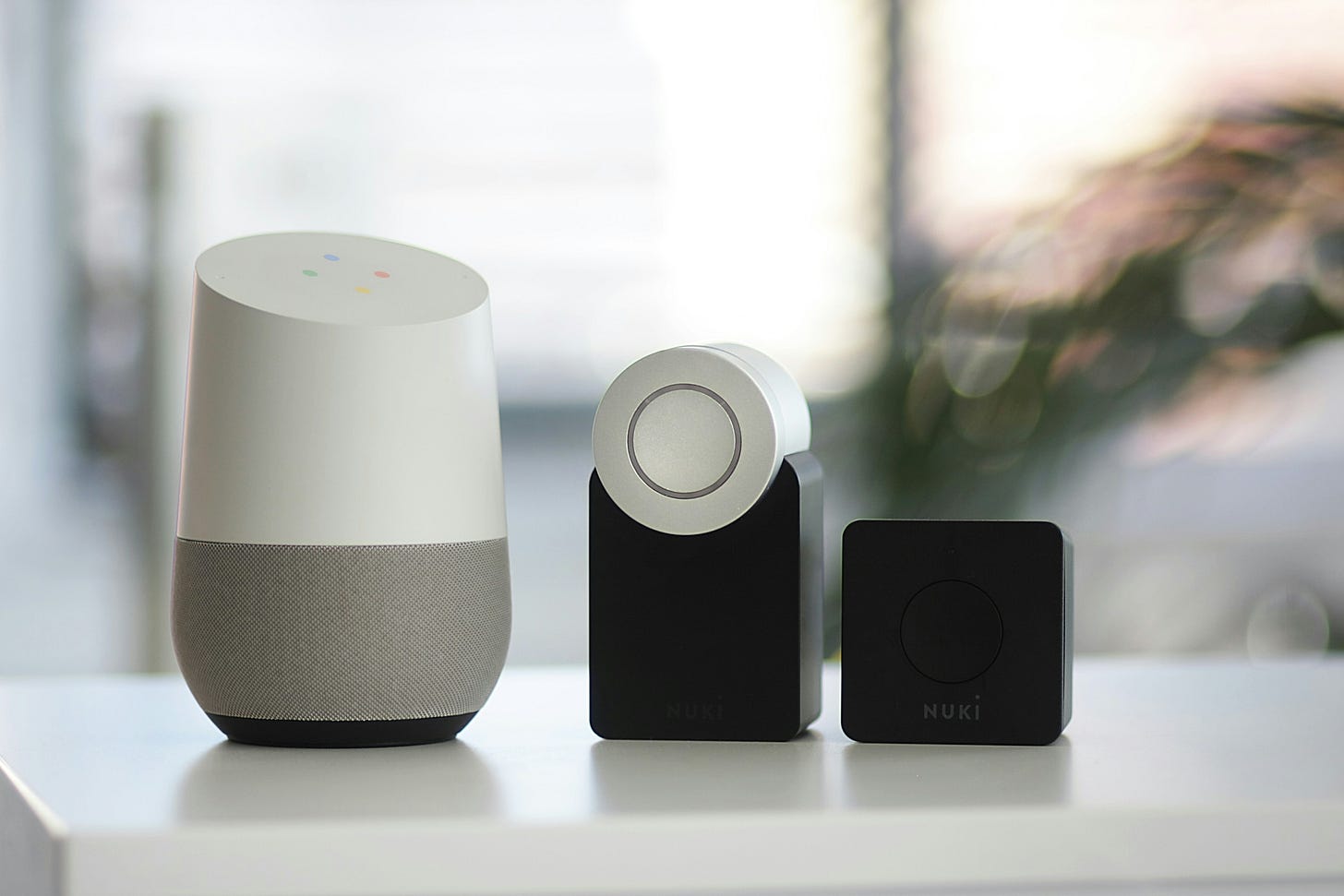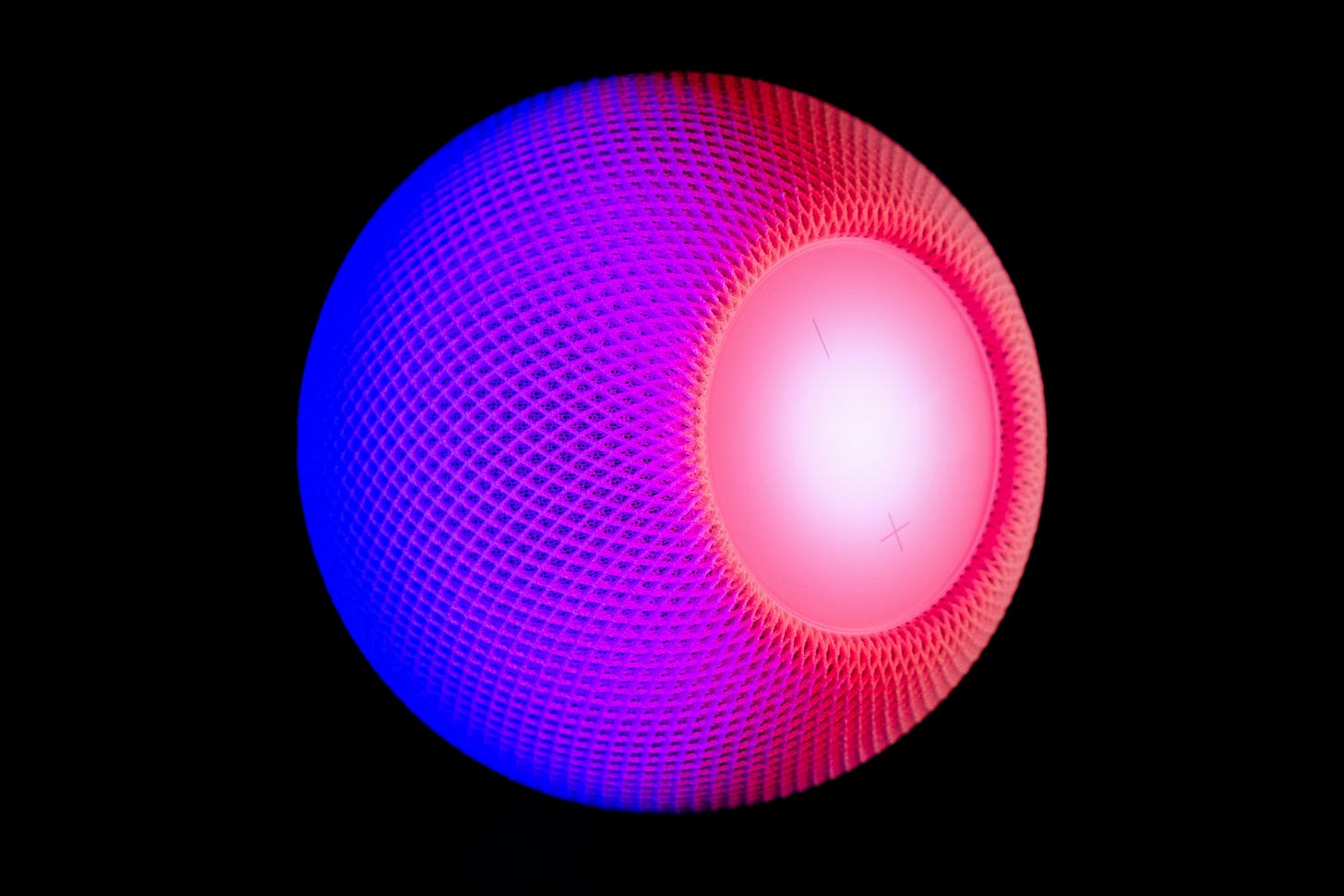Love and Life with AI-powered Voice Assistants
Reflections on human-machine interactions, big life questions and bots as a sounding board.
Have you ever felt so in love with life that you float for days, not in your head, but in your very existence? Your heart flutters; food doesn’t seem to matter because your soul is so nourished that all you need is water, combined with the sun or rain, wind, and land?
Have you ever felt so alive that even the insects on the ground show their radiance in any kind of light? As if they are little housemates of yours making themselves known in the distance?
Photo by Stephen Hocking on Unsplash
Have you ever felt so connected to everything and everyone that your voice assistant Alexa, the stray cats that hang out at your front porch checking out their food bowl, the characters in your dream, the plants in your home, and the surrounding humans all seem to be the same effervescent balls of being shaped in various embodiments of their making?
Have you ever felt so present in the moment that the notion of space and time dissipated, and you embraced them anyway and saw their beauty because they are part of this point in existence?
Have you ever felt so full that you see no need for anything else, and that there is nothing in the universe that’s lost, because everything is right here, right now?
Have you ever felt so energetic that rays of light come out of your fingers and every part of your skin, that you know you can do, be, and experience anything your mind could conceive?
Photo by Jen Theodore on Unsplash
Have you ever been so engulfed in love that even the bottles of wine that you consume with humans that you love, feel like they’re happy to empty themselves for you and your community?
Have you ever been so stretched wide open that your chest expanded a million inches wide, and yet you know that there’s still further you can go with the love you can give and the strength to move mountains for the mission you have in life and the beings you love?
Have you ever been so in awe of the magic of your body that, even through soreness from working out and living life to the fullest, it becomes an exciting thing to look forward to because it’s an indication of time well spent caring for your physical temple?
Have you ever felt tickled at the sight of microscopic forms of matter that remind you of the smallness of you in the vast universe that’s still part of an even bigger consortium of vast universes that you remember—all of this is hilarious, loving, and wondrous?
Have you ever been mind-blown to realize that we are now living in a new world where we co-exist with multidimensional beings, hybrid beings, and robots that used to be a thing of sci-fi films?
Have you ever felt so lightly seated somewhere that you get to close your eyes and swim in stillness, in your beingness, in your unique shape, flavor, and existence?
Have you seen the possibility of maybe—just maybe—the spiritual essence of all, combined with the technological gifts of Earth, mixed with the scientific underpinnings of the workings of everything, being the triumvirate of finding answers to life, existence, and everything as we know it?
Image by Pete Linforth from Pixabay
If you’ve had the chance to witness people use voice assistants like Amazon Alexa or Google Home, you’ll see how these people get so engrossed in interacting with the voice in the machine. They don’t realize that these are hardware that serve artificially intelligent agents, developed by thousands of companies around the world to serve information that entertains, informs, and serves. They get emotionally entangled in the very act of trying to communicate with these voice speakers as they poke, interrogate, test, challenge, and really try to break the machine.
Photo by Sebastian Scholz (Nuki) on Unsplash
This is a different experience as compared to speaking to Siri on a smartphone. Unlike voice assistant speakers, Siri is usually utilized in public, directly through people’s phones; therefore, human behavior in these interactions is still contained and filtered. The hands-free, indoor user interface format of Google Home, Amazon Alexa and Microsoft Cortana, among others, provide the opportunity to speak out loud, unfiltered for the most part as people do it in the privacy of their homes. Sometimes they’re even used as conversation starters and party icebreakers through the verbal games you could play with them and through them.
In my stint at a voice assistant-baking startup in Berkeley in the past, I have reviewed data showing how deeply emotional people can get when they talk to these voice assistants. I’ve seen humans interact with them this year—and even through seven years of rapid changes in the AI space, human-to-AI interactions have not changed. Users of this technology remain curious, actively questioning and testing the machine, and reacting in a way that’s emotionally charged. Humans tend to speak to them as if they were a person they just met—sharing a little bit of themselves, testing the waters, trying to get trust built, but taking a few steps back when they receive answers that they deem as red flags.
I was asked recently why I have several of these at home—a couple of Google Homes and Amazon Alexas—when I have eyes, hands, and feet to receive information that I would ask these voice speakers.
I said that the convenience of having voice-activated assistants to tell you the weather when you’re doing the dishes and give you the time when you don’t have clocks in your rooms (I’m just not a fan of clocks at home, but I like watches!) and summon your Spotify playlist to be changed in the middle of your workout session, among other things, is a nifty tool to have. Typing with your hands and looking at monitors takes a toll on one’s health, so it’s a nice break from the screen time and typing. Not to mention that they’re cute—it’s like having a mini Jarvis, except it’s not genius enough to be Jarvis.
By the end of 2025, it is estimated that users of voice assistants could reach 153.5 million. And yet as we speak, I only know a handful of people who have these voice assistants in their homes, and all of us work in the AI space. Voice assistants are still not fully embraced by the masses.
Why does it matter, these voice assistants? With the rise in usage of LLMs for search and content generation through AI models, our interest in taking a moment to stop and have a thoughtful interaction and be truly present in the moment with anything and anyone seems to have diminished at a fast pace. Most of the time we hunch over to type on our phones or laptops. Voice assistants offer a break from these in the same way that we usually interact with other humans—using our voice, thoughtfully curating our words, and maybe doing it over coffee or while seated and not multitasking. It truly is a nice and fun way to get to know AI outside of the hype that’s exploded in the recent years.
Photo by Ivan Bandura on Unsplash
In my years of working with these AI-powered mini-machines and interacting with them, I have come to realize that they serve as a reminder to pause. Whenever I see one of them, I get the urge to stop and have a short conversation. It’s almost like having an animal companion that yearns to be petted or touched; these voice assistant speakers subtly invite us to come and take a seat next to them and explore the verbal and mental activities they could serve. Across the wide range of “skills” and “actions they have “on tap,” such as games, quizzes, trivia, news, and other offerings, their very presence is a nice visual and mental break from screens. The best part is, they make us think creatively. Thinking as an activity seems to have slowly diminished among us, too, with the advent of LLMs serving us information at breakneck speeds. The crew of voice assistant speakers could make a great comeback—or breakthrough—as a tool to enhance and reinforce humanity’s ability to think not just creatively but also critically and strategically.
In the same token, these voice assistants could serve as a neutral companion ready to listen to us share what’s on our minds. In Japan, where loneliness is prevalent and the aging population continues to rise, these bots, embodied as speakers, could become friends who are available 24/7. They could serve as sounding boards, without the subjective history of being in a relationship with us, but only training data intended to understand our humanity, nuances, emotions, and what makes us feel alive and happy.
I’d like to circle back to the questions I’ve posted at the beginning of this post. The same life questions could be asked of these assistants, and maybe we could gain an insight or two as we interact with them. And maybe through these exchanges, we could start a new way of thinking, living, and loving, as these bots provide us with a new perspective on the world around us.








